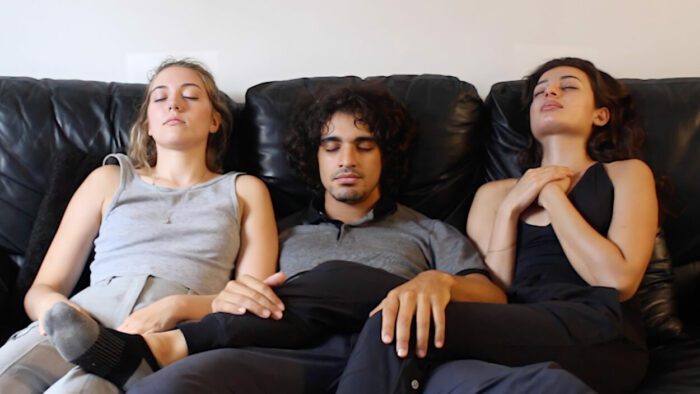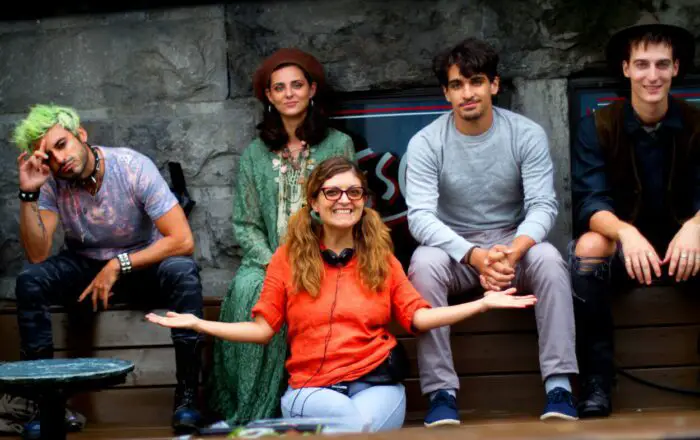Patricia Chica is a multiple award-winning Canadian-Salvadorian director, producer, and writer with over 60 hours of content under her belt. She specializes in high-quality auteur driven films that depict strong characters and thought-provoking stories with striking visuals. Patricia’s work has been Official Selection at over 300 international film festivals, and she has spoken or screened in theatres, art centers, universities, and conferences all around the world. Countries like Canada, the USA and Mexico as well as El Salvador have presented retrospectives of her films in the past few years. Chica grew up in her beloved Montreal, Québec, did her internship in Paris at age 22 and has had professional residencies in New York, Orlando, Toronto and London, UK. Since 2014, Patricia divides her time between Montreal and Los Angeles.
Her feature film Montréal Girls has been earning raves from audiences and critics across Canada and now, the U.S. She recently spoke with Film Obsessive’s Jason Sheppard about her journey on bringing her film to the screen and to rapturous audiences.
Patricia Chica: I was born in El Salvador and when I was a little girl, war broke out in my homeland, so we had to escape. That is how a lot of Salvadorian’s came to the US and Canada, and my parents decided on Canada. We landed in Montreal in the middle of the winter. I always knew when I was a little girl, I was a storyteller. In my childhood games, I was always writing poetry or drawing little stories. And I was the director with all my friends and cousins. I was dressing them up and directing them to be in my performance ideas. And I realized I was already becoming the filmmaker and storyteller I am today, working with people, making sure that poetry, beauty, and energy is present in everything I do. So, when we went to Montreal, I started making short films when I was 16. I’ve been holding a camera or directing a film since then.
When did you know this is what you wanted to do as a career?
I started thinking about filmmaking from the acting perspective at first, because all I could see in movies were the actors. I wasn’t aware that there was a director, a producer, and a scriptwriter. All I remembered as a child was looking at movies and seeing the actors perform so I thought, I want to do that too. I went to theater school to be an actor and in college, they told me, why don’t you film the making of our play so you can be behind the camera? And I thought, oh, that’s cool. I was making the video of the play and had more fun being behind the camera, in charge of telling that story on the screen than being the performer on stage. I realized that I wasn’t meant to be an actor because I like to make my own decisions. And that is how I discovered that I was better behind the camera.
How’s your experience working in the industry so far?
My experiences have been phenomenal. I feel grateful that I had a lot of rejections and when I mean a lot, I mean a lot. At first, when I was younger, I was depressed, angry, resentful, and frustrated because I was rejected for everything, for jobs, film festivals, funding, or grants, whatever. But then I switched my mindset after so many rejections, and said, well, I must do it on my own. I don’t have to wait for the phone to ring. I can do this by myself, and it is up to me if I become a director or not. So, I bought a camera and started gathering friends and collaborators and making my own short films and funding them out of my pocket just to be able to tell stories I wanted to tell. Eventually they got noticed and into film festivals, winning awards around the world. It was a journey, but what I learned is that never blame anybody else for your results. It’s up to you.
It’s up to you what actions you take and about taking control of your career. That’s how it really works. And be of service. Have something of value to offer, because you cannot just go knock on doors and expect people to give you what you want, to give you a role or to give you a gig, or to give you the opportunity to direct. It does not work that way. What is it that makes you special that people would be drawn to work with you, that you will attract those collaborators and those projects and those opportunities because you bring so much value? So, when I switched my mindset to be the one bringing the value, that’s when things started to happen for my career. So, when I say it has been phenomenal, it is because the first half of my career was a failure. And I learned from that failure to become even greater than if I hadn’t figured that out myself.

How important is the role of producing your own stories, the ones burning within you, the ones that you must tell?
It’s especially important for me to have control over the material that I generate myself. And that’s interesting about my career, when somebody hires me to be a director, I am detached. It doesn’t mean that I’m not committed, but I am detached. I don’t need to be the producer, I don’t need to have control. I’m there to serve a purpose and to serve the story and to bring value to the team. But when I tell my personal stories, the ones that came out of my gut feeling or my inspiration, those ones, I keep control as a producer because it’s important for me to stay involved in all the decision making for the sake of the integrity of the story. It’s my own voice, my own authentic vision of what I want to convey through those scripts or those projects. So that’s why I always keep producing credit. And as much as possible, the copyright is to protect the stories, to protect the integrity and the authenticity of those personal stories of mine.
And now, talking about Montréal Girls. You have three different, compelling lead characters here, each fleshed out with their own distinct qualities and personalities. How long did it take you working with those actors to get to that place?
It was quite a process to work with the actors on Montréal Girls, especially with Hakim Brahimi, who plays the lead, Ramy, because he wasn’t a professional actor or even a trained actor when I cast him. He was about to go study engineering at the university and had a full-time job at the bank.
Oh, wow.
So, I found him on Instagram out of desperation, because I had auditioned pretty much every single Middle Eastern young man that I could find in the industry, out of film workshops or film schools or acting schools. We auditioned everybody, and we could not find our Ramy. And I had two days to find him in the schedule that I had set. And I was going through Instagram, and I saw his photo and I said, my God, this boy looks exactly like Ramy, like how I envisioned the character. I asked my beloved assistant, Sophia, to contact him and ask him to put himself on tape. We received the tape very quickly. He shot it with his phone, and I saw that wow, he does look like the character, and he has that innocence and that prudishness and the qualities, the charisma I am looking for. But obviously, he is not an actor. He’s very green, very raw. So he came to the audition room, and I spent 90 minutes with him and the lead actor, Jasmina Parent, who plays Désirée, to try scenes with him. And I could observe that he was doing his best but wasn’t quite there to play the lead in the movie.
So, my intuition told me, sit him down on the chair and have a conversation with him. You’re pushing too far here trying him to perform in an audition room with all these people around. There’s too much pressure. So, I sat him down and started asking him questions about his life, where he’s from, what he likes, his hobbies, everything. Quite simple questions. And the moment he was talking to me about growing up in Algeria as a young boy, he became very emotional and started to cry, remembering the longing for his homeland. And I just said, wow, that’s him. I know I can work with him now because he’s able to tap into his emotions. So, then I told him right there in that room, I said, Hakim, I’m taking a huge risk to cast you in my debut feature because you’re in every single scene and you have no training. So, are you willing to put the effort and the time to be coached by me, to I make sure you’re ready for a production?
And he said, yes, but I have a full-time job. I’m going back to school. I said, well, that’s the condition. I mean, we must make sure you’re ready. You cannot just go on set with a few rehearsals. And then we left it at that. Two days later, he called me, and said, I just quit my job. When do we start? So, I knew I had a committed actor, that I could work with. And we spent a full year working on him, becoming aware of his body, his mind, his soul, learning energy, work, learning how to read the script, everything. In the movie’s documentaries, the whole training, we filmed that for a year, and he was ready. And now at most festivals, the audiences who have seen the film, they can’t believe he wasn’t an actor. I designed a very rigorous training program for him and Jasmina as well, to make them ready for their roles, but it really paid off.
Your instinct was absolutely right on with Hakim. He’s remarkable.
I’ll let him know that you said that.
I hope he gets recognized for other projects in the future. Is there a character of the three principles that is based more on yourself than the others?
Ramy and Désirée are two parts of who I am. I come from a very conventional, traditional Latin Salvadorian family. My family was quite religious and extremely strict. So, I transposed a lot of that journey, growing up in that environment, not being able to express myself fully into the arts, into the character of Ramy and the character of Désirée. It was later in my life when I became a rock and roll photographer in the subcultures of Montreal, I was navigating all those communities, the rockabilly and the punk rock, the artist as a photographer. So, Désirée and her spirituality also, it’s a lot of who I am as a young woman. So, those two characters are two sides of me.
I am going to go back and watch it again and pay attention more to the Désirée character after your response there, because I think I might pick up a little something else that I missed the first time.
Oh, I am sure you would. Another example you should watch is when the three actors, Hakim, Jasmina and Sana Asad (who plays Yaz), are in the street, walking towards Désirée’s apartment, and they are drunk on the sidewalk, and giggling and laughing after partying all night. We were running out of time that day. It was getting dark, and I had just a few minutes to do one take with them. And I had to get it right that they felt drunk. So, I used my Chakra Balancing method, and I completely disbalanced some of the chakras to get them to play drunk. And they were feeling so drunk that even Désirée felt it wasn’t in the script. She tripped and fell, and they reacted to her falling because they were not balanced.
They were all bubbly and not feeling really drunk that I had to get them out of their drunkenness. After we called cut, after the take was done, I had to get them back to ground themselves because they were still feeling the energy of drunkenness. So those are the tricks that I use on my sets to get the performances very quickly. And we always ended on time, never did any overtime. Everybody was happy.
Jason: How do you feel about the very positive reactions to the film?
Patricia Chica: I feel great that people resonate with it. What is funny is that at festivals, after screenings, Caucasian people tell me, especially older Caucasian people, they say, “What’s Ramy’s problem? Why is he struggling so much? Why doesn’t he just tell his father off or something, why does he have to be submissive to his dad?” Most Caucasian people who grew up in normal family’s don’t get that. But I have seen reactions from Middle Eastern people, from Indian people coming to me after a screening and tell me, oh, my God, this is so much of my story, Ramy’s story is my story. So, the target audience that I have discovered through the festival circuit is really the people who come from repressed families, conventional upbringings, they understand that journey. For most people in North America, it is okay, that is cool, I like the girl characters or other aspects of the film, not necessarily the character’s journey of Ramy. So, depending on where you are in your own quest, you will see different things in the film. I feel very blessed that we have gotten phenomenal reviews from the critics. And I strongly believe people appreciate the humility of the story. It’s a modest story, but a very heartfelt story.
You’re involved in many aspects of filmmaking, writing, producing, and directing. Do you have one you enjoy the most?
Of all the things that I do, yes. I like the connection with my teams, the harmony, the sacred space we create. I love every aspect of my career, but really, what makes an enormous difference is to find those collaborators that really align with a common vision together, and it is done in a space of collaboration and purpose.

Do you have any advice for anyone starting out, or even anyone who has been at it for a while? What would be the best advice you might offer as a filmmaker?
My best advice is that your energy is your most valuable currency. Make sure it is always high. Make sure you are always bringing value. Make sure that the filmmaker, the artist, the storyteller, the person, the professional you aspire to become in the future, you are already being that in the present. Don’t wait to finish school or get your degree or get your first job to become that person. Be it right now. Have that work ethic right now. Bring in those qualities right now. Because by being it right now, you will become it even faster in the future.
And the people you surround yourself with in your team are the most valuable assets because they can drag you down or they can lift you up. So, make sure you surround yourself only with people who will lift you up. So, you can also lift other people and pay back, pay forward.
And find a mentor. It’s important to find a mentor and to be an impeccable committed apprentice to a mentor you respect and admire.
Did you have a mentor earlier in your career?
I didn’t really have mentors, but I do have one now. And I would like to give a shout out to my mentor, Byron A. Martin. He took me under his wings about ten years ago and taught me so much of what I know today about producing, about marketing, networking, and being the best filmmaker, I can be. And he did it out of generosity. He was not expecting anything in return. He just saw my talent and my commitment, and he took me under his wing. And now he has become my production partner.
Do you have any upcoming projects you would like to briefly mention?
Yes. Well, I have a few upcoming projects, and I invite people who want to learn more about this process with CHI Energy to look me up on social media. They can find me on Patriciachica.com and TheChicamethod.com is my energy coaching for actors. And if people want to see the documentary on the making of Montréal Girls they can reach out to me, and I will send them the private link. They can write to me via my website or Instagram and Facebook. I’m all over the place, so you can find me for sure.
MONTRÉAL GIRLS begins playing in U.S. theaters June 2, 2023 and on demande une 27, 2023, with its Canadian release scheduled for June 9, 2023.


